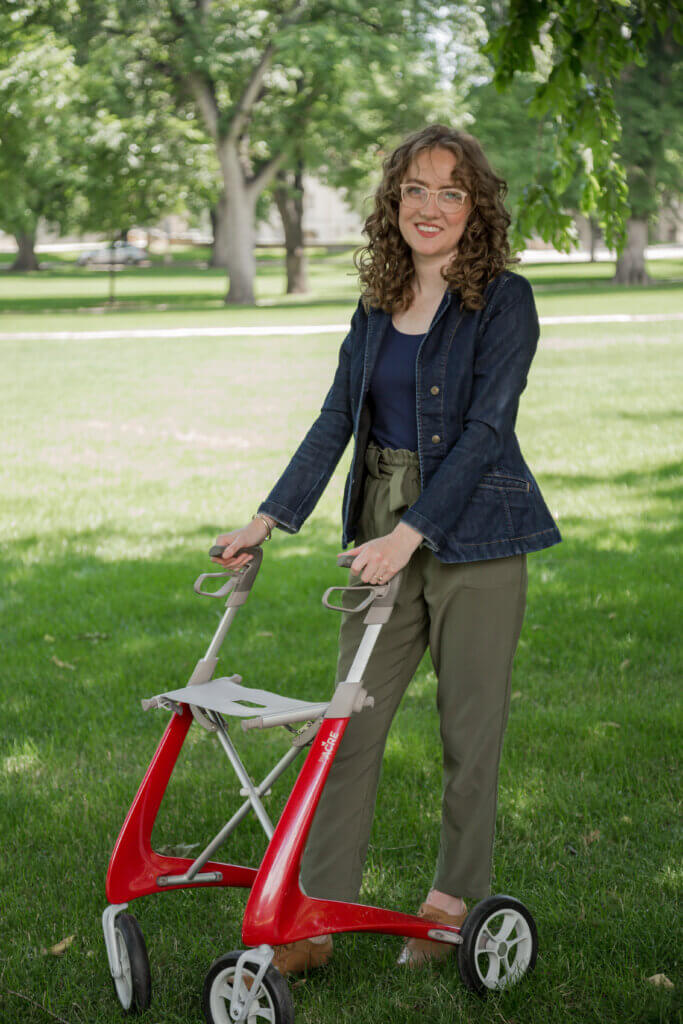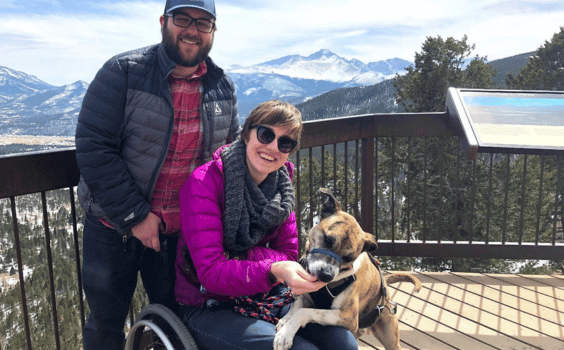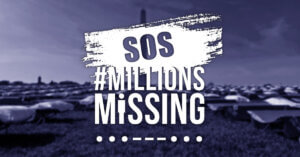Have you registered yet to join us this Wednesday, December 6th at 4pm ET / 1pm PT for a community presentation introducing the Canary Corps program?
Ahead of Wednesday’s event we wanted to share with you Alison’s story. Alison Sbrana will be co-presenting this event, and much of the design of Canary Corps has been shaped by both her professional and lived experience. Her story is a sneak peek of what’s gone into the making of Canary Corps.
The purpose of Wednesday’s event is to explain the local disability services and supports that Canary Corps can help our community connect to. Whether you are someone looking for help from Canary Corps, or are interested in volunteering, we encourage everyone to attend.
This is a long email so here is a quick energy-limited summary of key things to remember:
Energy-limited Summary:
- Register for this Wednesday’s Dec. 6th community introduction call to Canary Corps.
- People who register will be sent a recording of the event (whether they are able to attend in person or not)
- The event will explain the local disability services and supports that Canary Corps can help our community connect to.
- This event won’t get into details about how program participation or volunteering works. Visit our website FAQ for those details. More information coming in January.
- Read on for a sneak peek into Alison’s story and the making of Canary Corps.

Alison’s Story
Hi! I am Alison Sbrana, a disability activist and lived experience expert based in Fort Collins, Colorado and I am working with #MEAction to design and build the Canary Corps program.
I am passionate about helping chronically ill and disabled people understand their rights and navigate barriers accessing care and services available to support them.
In 2014 my own life was upended when I got a viral infection that led to me developing ME/CFS, POTS and associated conditions. Like far too many people in this community, I have not only experienced medical trauma from not being able to access knowledgeable medical and emergency care for these chronic illnesses, but I’ve also struggled to access care and services to support my daily life as a disabled person.

In 2016 my chronic illnesses worsened due to lack of access to informed care and support services, which had a daily impact on my financial survival. I had to go against medical advice (to Stop. Rest. Pace.) and push myself to continue working until my body literally couldn’t continue another day. It took me many years to get access to all the supports and services I have now that made any chance of financial stability and medical stability possible.
Even today, my ability to manage my medical condition is deeply intertwined with my financial survival. In 2022, I spent $13,421.40—an amount equal to a year’s worth of income at 100% of the federal poverty level for an individual—on medical expenses alone! That used up all of my SSDI payments for the entire year, just on medical expenses.
Depending on the day, I may or may not “look” disabled to some people. But I know my fluctuating, dynamic disability—which people with ME often experience—is still a disability, and we absolutely deserve disability services and supports!
I share these pieces of my personal experience with you not because it is unique, but because it is so common across our community. I also acknowledge that chronic illness and disability exacerbate and intersect with existing social inequities and other forms of discrimination that I have not experienced.
What I haven’t yet shared with you, and makes my personal experience less common, is that I’ve also had the opportunity to work within the disability support and services system. In the early years of my illness I worked as a community health care manager for Colorado’s Medicaid program.
Operated by individual states, Medicaid provides health coverage to millions of Americans, and is the primary payer across the nation for long-term care services, including children, adults, and seniors who need care because of disabling conditions and chronic illnesses.
The disability support and services system is complex and can be exclusionary. This makes it hard to navigate for people with infection-associated chronic illnesses. I worked in the office that processed Medicaid waivers in my county and even though my employers saw my energy-limiting condition up close, I was still misinformed and told I would not qualify for long-term care services at that time. Even with my privileged position working within these programs I still struggled to get accurate information or access to services.
Thankfully, I did not give up and I eventually found others working within the disability support and services system who gave me both the information and the assistance I needed to successfully apply and receive ongoing program support. I found this help both locally at my Center for Independent Living where a disabled peer helped me apply for SSDI and at my local enrollment site that helped me apply for Medicaid, but also online through support groups and with ME-specific resources like How To Get On.
It wasn’t easy, and I made plenty of mistakes along the way, but in all my years living with ME/CFS, POTS & associated conditions there is one thing that has made the biggest difference in my quality of life. By far, that is the disability supports and services I receive. These make it possible for me to use my limited energy to build a fulfilling life out of a new normal living with chronic illness and disability in my community.

I know I’m lucky to live in a state like Colorado where I have access to an especially strong and expansive disability support and services system. I had many privileges that enabled me to find and obtain the help I needed. But regardless of where in the U.S. you live, I want people in the infection-associated chronic illness community to know that you have a disability that absolutely deserves access to disability services and supports. The disabled and chronically ill activists who came before fought for us to have the right to access these supports and services.
That is why I’m so excited to be helping #MEAction design a national peer-assistance model that helps our community navigate access to local disability services and supports. I hope you’ll join me this Wednesday for an introduction to Canary Corps and to learn more about the help that has made such a big difference in my quality of life and could hopefully in yours as well.
In Solidarity,
Alison and Ben










